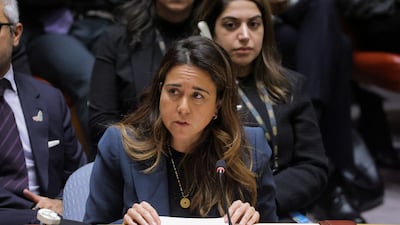The UAE's two-year term on the UN Security Council, which draws to a close next week, covered a period of momentous global upheaval that exposed the divisions on the world body.
But through it all, the UAE sought to act as a unifying force that emphasised diplomacy and the need to build bridges.
When the UAE took its seat as a non-permanent member in January 2022, the Security Council was already navigating a complex international landscape defined by growing gaps between the West and Russia and China.
In the two years since, Russia has invaded Ukraine, the US has pulled out of Afghanistan, the war in Yemen is rumbling along at various levels of intensity, Sudan is in a spiralling civil war and the Israel-Gaza war is raging.
The five veto-holding countries – Russia, China, Britain, France and the US – have often struggled to come to a consensus on pressing issues, highlighting the urgent need for reform at the panel.
Here, The National takes a look at what the UAE was able to accomplish during its tenure.
Gaza and other humanitarian crises
Representing the interests of the Arab Group, the UAE has also been at the forefront of diplomatic efforts to stop the violence in Gaza and increase aid to the Palestinian enclave.
On Friday, the UN Security Council adopted a resolution, drafted by the UAE, that was aimed at scaling up aid to the Gaza Strip and setting the conditions for a reduction in violence, as the world body warned Israel's assault on the Palestinian enclave is pushing it towards famine.
After four postponements this week amid a full diplomatic push to avoid a US veto, the UAE's resolution received 13 votes in favour and two abstentions from the US and Russia.
The UAE also announced a “digital disaster response platform” to try to co-ordinate global humanitarian efforts.
The platform aims to address “a clear gap in our humanitarian capabilities and help countries impacted by natural disasters get what they need, where they need it – as quickly as possible”.
Hate speech
In June, the Security Council unanimously adopted a resolution, jointly drafted by the UAE and the UK, acknowledging the role of hate speech, racism and other forms of intolerance in fuelling conflicts.
The resolution also highlighted the effects of gender discrimination and acts of extremism on global peace and stability.
“It’s a time when the world is experiencing the highest number of armed conflicts since 1945, and across the globe we’re seeing an increasingly worrying rise in intolerance, hate speech, racism and extremism, all of which undoubtedly fuel violence and divide communities,” said Lana Nusseibeh, the UAE's ambassador to the UN.
“These are threats to international peace and security, and they’re not limited to a single country or region.”
Climate change
It has also advocated tirelessly for climate security, pushing for the integration of climate considerations into the Security Council's agenda. The UAE made a point of highlighting how the root causes of conflict are being exacerbated by climate change.
The country hosted the Cop28 climate conference this year, during which a loss and damage fund was established as well as an agreement to reduce fossil fuel production and use.
Women's rights
The UAE also emphasised women's empowerment and gender equality in peacekeeping and conflict resolution.
As a signatory to the Statement of Shared Commitments on Women, Peace and Security, the UAE encouraged all briefers to include relevant gender analysis in their briefings.
It also advocated greater involvement of women in peace negotiations and peace-building efforts.
In addition, the UAE was the “co-penholder” with Japan on Afghanistan, which meant it drafted resolutions and issues related to the impoverished country.
In April, the council unanimously adopted a resolution drafted by the UAE and Japan condemning the Taliban’s decision to ban Afghan women from working for the UN in the country.
The resolution was co-sponsored by more than 90 UN member states, including, for the first time, more than 28 member states of the Organisation of Islamic Co-operation (OIC).
Ms Nusseibeh said the resolution sends a “clear signal going into that meeting of the position of the international community, of international law and of the Security Council on the essential role of women and girls, and the role they play in every society, including in Afghanistan”.


